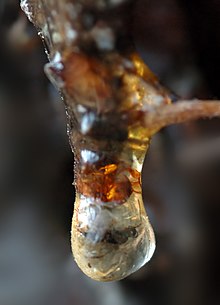
Back Hars Afrikaans راتنج Arabic Resina AST Papaskiw (irinacitc) ATJ Qatran Azerbaijani کیتیرگه AZB Ыҫмала Bashkir Baambeech BAR Смала Byelorussian Смола Bulgarian


In polymer chemistry and materials science, a resin is a solid or highly viscous substance of plant or synthetic origin that is typically convertible into polymers.[1] Resins are usually mixtures of organic compounds. This article focuses mainly on naturally occurring resins.
Plants secrete resins for their protective benefits in response to injury. Resins protect plants from insects and pathogens.[2] Resins confound a wide range of herbivores, insects, and pathogens, while the volatile phenolic compounds may attract benefactors such as parasitoids or predators of the herbivores that attack the plant.[3]
- ^ "resin". IUPAC Compendium of Chemical Terminology. 3.0.1 (3rd ed.). International Union of Pure and Applied Chemistry. 2019. doi:10.1351/goldbook.RT07166.
- ^ "Resins". www.fs.fed.us.
- ^ "Plant Resins: Chemistry, evolution, ecology, and ethnobotany", by Jean Langenheim, Timber Press, Portland, OR. 2003
© MMXXIII Rich X Search. We shall prevail. All rights reserved. Rich X Search